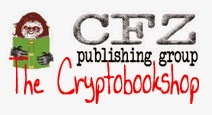 Alan first came to my notice when he turned up at our stall at last November's Unconvention. He was clutching a box that had once held a plastic Christmas Tree. He thrust it at me, and said "Here's your mermaid".
Alan first came to my notice when he turned up at our stall at last November's Unconvention. He was clutching a box that had once held a plastic Christmas Tree. He thrust it at me, and said "Here's your mermaid". I vaguely remembered Richard F. having said that one of his mates had offered to make us a feegee mermaid, but I had forgotten all about it. Sad to say, so many people offer to do stuff for us, and then fail to deliver, that I had got into the habit of treating all such offers cum grano salis, but the advent of Alan shows that I should not be such a cynical old sod. Now he has become a guest blogger, and furthermore a guest blogger who's output is often so elegantly macabre that I have started hassling him to write us a book....
The sad passing of John Michell was bad enough, but now with the death of John Keel this week, the world of Forteana has lost two of its biggest hitters.
When I was an impressionable kid, in thrall of comic books, late-night horror films and the childish sophistication of B-movies, the field of Fortean phenomena was seemingly insulated--compartmentalised, even. To me, lake monsters were plesiosaurs or a reasonable facsimile, ghosts were the shades or recordings of the unquiet dead looking to tie up loose ends on this side of the great divide. Bigfoot was some prehistoric remnant who had somehow managed to avoid being struck from the genetic or evolutionary record, and of course, UFO’s were nothing more than our distant neighbours from Gamma Regula, or wherever, popping round for a cup of Earl Grey, and then perhaps to pick up some water samples on the way back home.
It appeared that each phenomena, and all levels and associated belief systems upon which they functioned, had it’s own generic status, and recognisable identity, none of which were related to or perceived as being remotely interchangeable with their equally intriguing, but completely disparate fellow mysteries.
The first UFO book that I ever read was John Michell’s The Flying Saucer Vision, and while I was way too young to participate in--or even be much aware of--the ‘counter culture’, as posterity would have it known, Michell’s overview of cosmic possibilities, and how both prehistoric earth mysteries and the present day percipience of UFO’s and related phenomena could tie in to a cultural and folkloric gestalt was fascinating.
This was swiftly followed up by pretty much every UFO book that I could get hold of, most of which trotted-out the old extraterrestrial hypothesis with which what became tedious regularity.
Then I ran across Keel’s UFOs: Operation Trojan Horse, which, quite frankly, scared the crap out of me. I would never see UFOs in the same way again.
Of course, the idea that reality--or at least as we perceive it to be so--might not only be abstract, but malleable on different levels of consciousness or temporal structure is hardly a new one--many religious doctrines subscribe to similar concepts, and Charles Fort himself appeared to arrive at conclusions not unadjacent to those of Keel’s, cumulating in perhaps his most chilling statement: “I think we’re property.” But Keel made the whole situation plain and specific, and whether you bought it or not, it still made for a very scary bedtime story.
As Jon said in his Keel obit, Keel--and Michell--were representatives of a ‘golden age’ in the study of Fortean phenomena, a time when W.H. Smiths had shelf after shelf of books full of UFOs, Loch Ness monsters, Stonehenge, big cats and Uri Geller bending forks. It was a great, and inspirational time to be an enthusiast, and I have to say that one of the things that first attracted me to the CFZ was that at the Uncons, Jon and Richard seemed to project that same sense of fun that I remember experiencing as a kid.
Although Keel and Michell are seen as being influential to, and representative of the ‘counter culture’, they are both, at the heart of the matter, much more sophisticated than that. While the counter culture movement was protesting and rejecting a system of values that it perceived as restricting and oppressive, its adherents often expressed its cosmic views in traditional terms, inasmuch as UFOs, for example, were still identified in the minds of many ‘free thinkers’ as beings from another world, ghosts were spirits of the dead, etc, and so the very people who would see themselves as being ‘far out’, still found it difficult to shake off restraint and conservatism when it came to the perception of a supernatural universe. Even David Bowie, long-time UFO enthusiast and regular sky watch attendee, believed that the phenomena was attributable to visitors from distant planets: “There’s a starman waiting in the sky, he’d like to come and meet us, but he thinks he’d blow our minds.”, or words to that effect anyway; and writers like Von Daniken, while promising a revolutionary perspective, still placed their saucers and chariots in a quantifiable cosmos, which seemed, on the surface at least, to hold no unpleasant, or status-quo-threatening surprises.
It would seem, in retrospect, that Michell and Keel’s greatest legacy is in that their work was never simply a part of the zeitgeist in which they--and we--lived, and, unlike many of their contemporaries whose work has dated and lost relevance, their writing still inspires, in an increasingly mysterious universe, contemplation, and indeed, appreciation.


















No comments:
Post a Comment